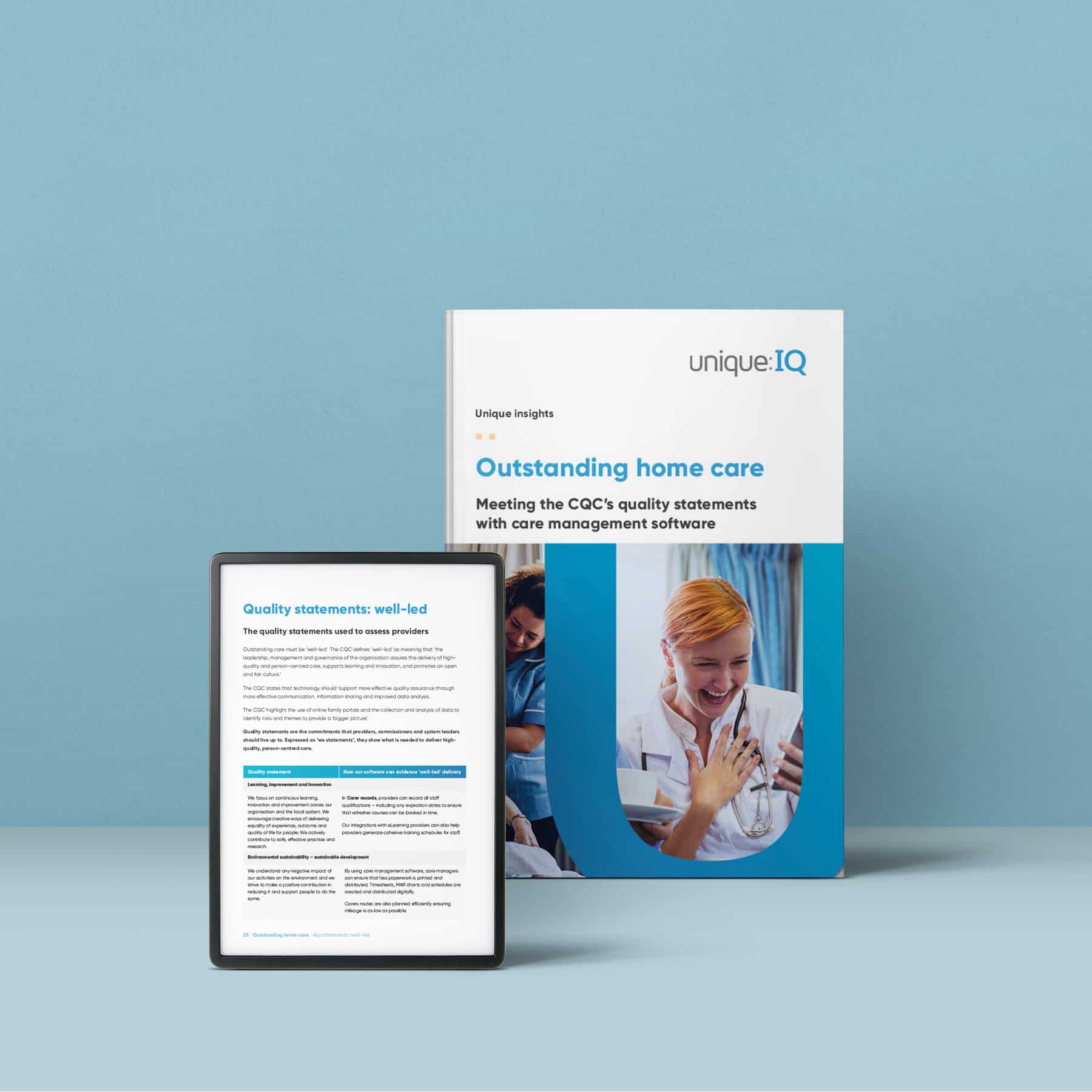2020: the year the domiciliary care sector changed forever
2020 has been a big year of change for the care sector. Not only has Covid-19 challenged the way providers and carers work, but we’ve also seen huge developments in policy, reform and the adoption of technology throughout the sector.
Care Quality Commission – State of Care Report
Covid-19 was at the centre of this year’s report and the CQC had four key areas of focus:
- People at the centre: How did providers collaborate to ensure that people moving through health and care services were seen safely in the right place, at the right time, by the right person?
- System leadership: Was there a shared plan, values and system-wide governance and leadership during the first months of the pandemic in England?
- Workforce capacity and capability: Was there a strategy for ensuring sufficient health and care skills across the health and care interface?
- Digital solutions and technology: What impact have digital solutions and technology had on providers and services?
It was a positive story for tech. The CQC found that in most cases, technology was adopted quickly and rolled out efficiently – even in places where there was previously reluctance. And saw that those that had already migrated to digital solutions like care management systems were better prepared to work together and stay connected.
Download our free guide to outstanding home care
This guide provides a comprehensive overview of how our care management software will support your home care organisation in meeting the CQC’s five key questions, along with an in-depth analysis of the newly announced quality statements.


The CQC announces a pilot for virtual inspections with domiciliary care providers
In September, the CQC set out its new ‘digital first’ strategy from mid-2021, which will see a much heavier focus on using technology in regulation. So far, this will include:
- A new digital platform for provider engagement – described as “an ongoing portal that allows care providers to upload data and information”
- Mobile apps to support inspection and enforcement
- The use of AI in risk assessment and intelligence
By enabling access to shared learning, information, advice, and support, the regulator will move away from relying on periodic inspections, instead, harnessing the real-time data to measure performance to continually assess quality and update ratings.
Skills for Care – State of the adult social care sector and workforce in England
An absolute trove of up-to-date care sector information, one of the most interesting stats showed that domiciliary care sector jobs (43%) now account for more jobs in the sector than residential care (41%). More takeaways from the data:
- The average turnover rate for staff was 34% across all ages, but for those under 20 years old, it was a staggering 46.9%. (Read more about our thoughts on Generation Z care workers here)
- Currently, about 1.5 million people are working in adult social care, but with an aging population, this could rise by 520,000 by 2035.
- Establishments with overall ratings of ‘inadequate’ or ‘require improvement’ had higher turnover rates compared to those that had ‘good’ or ‘outstanding’ ratings (32.2%, and 29.5% respectively).
TSA & ADASS – a new commission for digital reform
2020 also saw a new commission set up to make recommendations on the role of digital in a reformed adult social care system. The Association of Directors of Adult Social Services (ADASS) and the TEC Services Association (TSA) joined forces to explore how better access to technology could improve joint working between health, social care and housing.
- The commission will launch a report in March next year and will make recommendations on:
- Mainstream the use of everyday devices
- Data insights and reporting
- Specialist technology to extend and enrich people’s lives
NHS Digital launches new care standards
Commissioned and led by NHS Digital and produced by The Professional Records Standards Body the new national standards have been introduced to ensure that information is recorded and shared clearly and consistently across health and social care. Therefore professionals will have a full picture of a person’s needs, enabling them to provide safer and individually tailored care.
The new standards cover:
- ‘About me’ – the personal details that a person would like to be recorded about themselves.
- Health and care information shared in care homes.
- Information shared by local authorities
- Referrals for community assessments for care and support after a hospital stay
- The urgent information needed when a person is transferred to hospital from a care home
2020 has been a tumultuous year in more ways than one. Political upheaval, a global pandemic and a fragile economy rocked the nation. Yet the domiciliary care sector has continued, facing every challenge with strength and resilience. If 2020 has given us anything, it has been the impetus to adapt and grow. In 2021 we’re excited to see the role technology will play in the changing face of care.
Want to know more about technology and the CQC? Read our comprehensive blog series.

